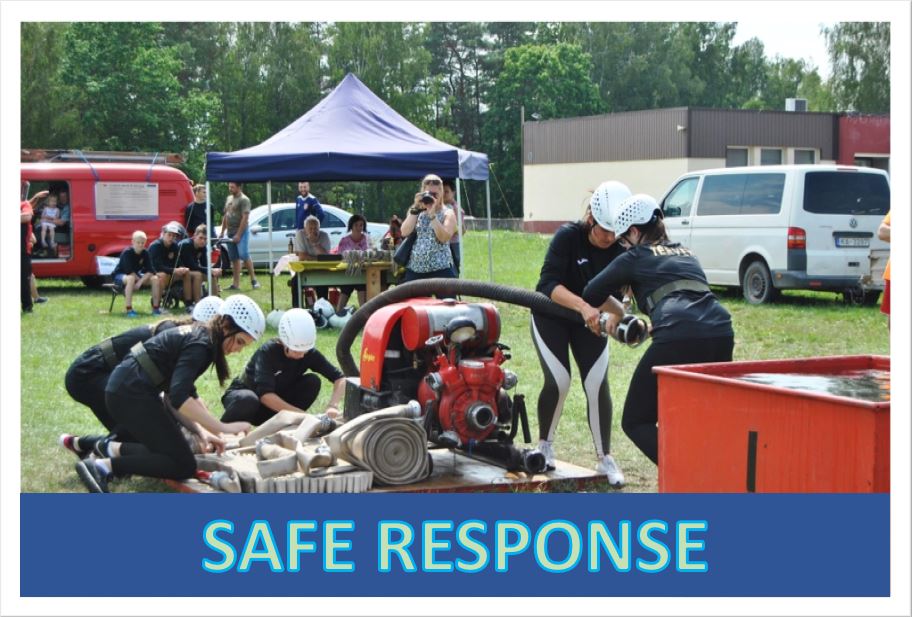Send us a message

Project duration
01.03.2024 – 28.02.2026
Project ERDF co-financing
539 004,20 EUR
Safe Response
LL-00077
Response and prevention of climate change risks and extreme weather events in the cross-border region of Latvia and Lithuania
Common territorial challenge (s) that will be tackled by the project
The Safe Response project addresses shared climate change and extreme weather challenges in the Latvia-Lithuania cross-border region. Zemgale, Latvia, faces heightened flood and fire risks, worsened by the temporary suspension of 18 Latvian firefighters' stations. In Lithuania, 54 river sections pose flood risks, impacting Joniskis and Pakroujis municipalities. The project enhances local capacities and cooperation, focusing on joint preventive measures and events to effectively address climate change risks. It aims to improve the existing cooperation mechanism among bordering municipalities and boost the low capacity of security actors in partner municipalities.Project objective
Safe Response strengthens cross-border municipalities' emergency response, fire protection, and civil protection capacity and cooperation to address climate change-related risks. Measurable objectives include joint civil protection measures and infrastructure development with reduced risks of damage to life and property, benefiting local communities and the wider population. This contributes to the program's objective of promoting climate change adaptation and risk prevention.Planned activities
The Safe Response project is a cross-border initiative addressing climate change challenges in the Latvia-Lithuania region. It focuses on enhancing local capacities and cooperation for emergency response, fire, and flood protection. The core strategy involves joint preventive measures, civil protection events, and extensive training with disaster simulations. Additionally, the project facilitates experience exchange visits among partner municipalities. Seminars on climate change risks, informational campaigns, and the provision of new equipment and infrastructure further strengthen the response capabilities of partner municipalities. This includes disaster prevention equipment like water pumps, boats, drones, and surveillance systems, as well as infrastructure such as water level measurement stations. The project culminates in a dissemination conference to share knowledge and experiences, contributing to climate change adaptation and risk prevention in the cross-border area. Overall, Safe Response takes a multifaceted approach to address common challenges related to climate change and extreme weather events.Project results
The Safe Response project is a pivotal cross-border initiative addressing climate change challenges in the Latvia-Lithuania region. The project’s primary focus is on fortifying local capacities and fostering cooperation among partner municipalities to enhance emergency response, fire management, and flood protection. At its core, the project employs a multifaceted strategy that encompasses joint preventive measures, civil protection events, and extensive training sessions featuring disaster simulations. This comprehensive approach extends to practical knowledge exchange through experience-sharing visits among partner municipalities, cultivating a collaborative atmosphere and fostering the sharing of best practices. To raise awareness and disseminate knowledge effectively, the project conducts seminars on climate change risks and informational campaigns targeting various stakeholders. This outreach contributes significantly to enhancing understanding about best practices in risk and emergency management. To fortify the resilience of partner municipalities, the project proactively provides essential disaster prevention equipment, including water pumps, inflatable boats, drones, and surveillance systems, alongside infrastructure enhancements like water level measurement stations. The project concludes with a dissemination conference, providing a platform for stakeholders to share knowledge, experiences, and results. This pivotal event fosters collaboration, allows reflection on achievements, and charts a course for sustained impact. Emphasizing the indispensable role of cross-border cooperation, the project underscores its necessity due to the transboundary nature of climate change impacts. Recognizing the limitations of regional and local actors in independently tackling climate-related challenges, the collaborative framework becomes imperative. By working collectively, project partners can pool resources, share knowledge, and craft a more nuanced and coordinated response. Beyond the immediate project timeline, the initiative aspires to create lasting impacts by fostering sustainable cross-border cooperation among the five partner municipalities. This endeavour is underpinned by the delivery of enhanced capacity and cooperation, supported by the development of a joint emergency response plan and a signed cooperation agreement. These strategic documents are envisioned to serve as a robust framework for continued collaboration, ensuring that the benefits of the project contribute to the creation of a sustainable and resilient cross-border region. In summation, the Safe Response project emerges as a beacon of collaboration and preparedness, addressing the intricate web of challenges arising from climate change in the cross-border area. Its holistic approach, encompassing training, equipment provision, and cross-border cooperation, signifies a paradigm shift in climate adaptation and risk prevention, laying the foundation for enduring collaboration and resilience in the face of evolving environmental challenges.
Social media and contacts:
-
January 28, 2025 - January 28, 2025
Meeting with the environmentalist naturalist Selemonas Paltanavičius “How to write 100 books about the nature” in PakruojisPakruojis Synagogue, Kranto gatvė, Pakruojis, Pakruojis District Municipality, Lithuania
-
November 28, 2024 - November 28, 2024
Online seminar "Climate change impacts on society and territories" -
November 22, 2024 - November 22, 2024
Virtual reality education „The Green Message“ -
October 3, 2024 - October 3, 2024
Experience exchange visit in Jelgava Local Municipality -
August 28, 2024 - August 28, 2024
Training for Municipal Police Officers "Stress resilience, conflict resolution and mediation for municipal police of Bauska region" -
August 27, 2024 - August 27, 2024
Security in emergency situations affected by climate risks -
July 22, 2024 - July 24, 2024
ArcGIS Pro: Essential Workflows 3 (three) day training programme





